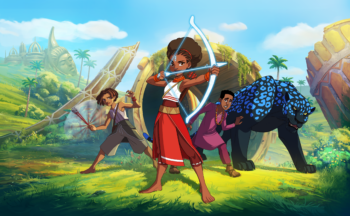By Gary Symons
TLL Editor in Chief
It’s probably fair to say that increased diversity in the entertainment industry has been driven primarily by activism by under-represented groups, particularly women, racial minorities and the LGBTQ+ community.
But it’s also true that the industry is getting the message, and now understands that having diversity both in characters and in the creative teams is good for business.
For that reason, as we look at diversity in the entertainment and character sector, we reached out to Lion Forge Entertainment, the largest black-owned studio in America, and founder David Steward II, whose career is based on boosting the levels of representation of under-represented communities in publishing, film and television.
The studio is just about to launch the highly anticipated series “Iyanu,” based on the graphic novel by Roye Okupe. It draws deeply from Nigerian culture and mythology, features a young female protagonist, and offers a fresh perspective that resonates with kids by celebrating stories that reflect their own identities and experiences.
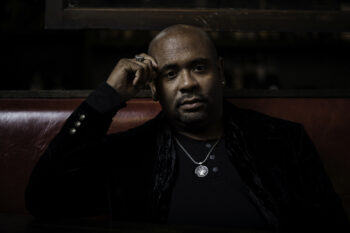
Steward first dove into publishing with the founding of Lion’s Forge Comics (now the Oni-Lion Forge Publishing Group), and later founded Lion’s Forge Entertainment.
In both those companies Steward hired a diverse group of creators, who have produced an equally diverse range of comics and animated productions.
“I’ve always been passionate about storytelling, and from the start, I believed there were so many untold stories that deserved to be shared and believed I could bridge the gap to tell stories that better reflect the world we live in,” Steward says. “It all started in 2011, when I founded Lion Forge Comics focused on bringing diverse, authentic narratives to the comic book world.
“In 2019, we took a significant step forward by merging Lion Forge Comics with Oni Press to form the Oni-Lion Forge Publishing Group, a move that allowed us to expand our reach and impact,” he added. “The publishing group now operates as part of my larger media company, Polarity, which encompasses a wide range of entertainment ventures.
Lion Forge Animation (now Lion Forge Entertainment) was founded in 2018, and quickly gained notice in Hollywood. The company’s first release, an animated short called Hair Love, not only won an Oscar, but also resulted in the company being named one of America’s Most Innovative Companies by Fast Company.
“I launched Lion Forge Animation with the goal of creating content that would resonate with audiences worldwide and showcase a broader spectrum of voices,” Steward recalls. “The success of our first animated short, ‘Hair Love,’ which went on to win an Academy Award for Best Animated Short Film was a turning point, reinforcing my belief that stories with diverse perspectives not only matter, but can also make a lasting impact on the global stage.”
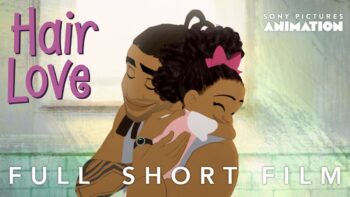
As noted in TLL’s recent feature on Diversity in Entertainment, evidence gleaned from multiple studies shows that Steward and Lion Forge have the right idea. Having more diverse characters and story lines isn’t just a ‘nice to have’ in the business; it’s actually an important way studios and publishers can increase audience buy in, and boost revenues.
In fact, a lack of diversity was found in a UCLA study to actually hurt box office revenues or TV ratings. The study looked at the financial performance of movies based on their level of authentically inclusive representation (AIR), or the extent to which a film included and authentically portrayed diverse groups or cultures. It concluded that large-budget movies, defined as those over $159 million, that rank below average in AIR, typically underperform by $32 million, or 20% of the budget, at opening box office weekend.
Similarly, research by Accenture shows that more diverse movies make more money, and diverse audiences can be higher-value audiences. Across all three of the most used rating measures (IMDb, Rotten Tomatoes Critic, and Rotten Tomatoes Audience), films with above-average diversity scores (as measured by Mediaversity) received higher ratings, regardless of production size.
The reasons should be fairly obvious. If you don’t include women (over 50% of your audience) or people of color (more than 40% in the US) in your casting and story decisions, you’re cutting a lot of people out of the fan base.
Lion Forge takes the exact opposite approach, hiring creatives and cast members who reflect the diversity one sees in the real world.
“When we say we ‘walk the walk,’ we truly mean it,” Steward says. “We take immense pride in championing diverse voices, and this commitment is reflected in everything we do, from the books and comics we publish to the movies and TV shows we produce.
“Our efforts are not just about representation on screen but also ensuring that diverse perspectives are woven into every aspect of the creative process, both in front of and behind the camera.”
Stewards says diversity in storytelling and content creation is important because it is not experienced enough in the industry.
“At Lion Forge, we are intentional about working with all marginalized groups, including female and LGBTQ+ among all others, because we recognize the importance of amplifying voices that have historically been diminished and helping to level the playing field,” he explains. “The reason we embrace differences and create a diverse portfolio of content is so everyone is able to find something that speaks to them. Content that people see themselves in is not created in a vacuum. It’s a focused exercise.”
While Steward says diversity in story telling is good for business, he points out it’s also good for the world at large, as it promotes the type of understanding and acceptance that helps reduce levels of societal racism and intolerance.
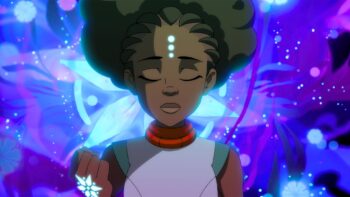 “Broadly, the world is a better place when there is acceptance and understanding of diverse cultures and views,” he argues. “Understanding varying viewpoints not only enriches our own experiences but also enhances our collective ability to address challenges and create solutions.
“Broadly, the world is a better place when there is acceptance and understanding of diverse cultures and views,” he argues. “Understanding varying viewpoints not only enriches our own experiences but also enhances our collective ability to address challenges and create solutions.
“By moving beyond stereotypes and creating spaces where everyone is valued, we build a society where all individuals have the opportunity to contribute and thrive.”
Like many studios, production at Lion Forge was reduced during the 2023 job action by the Writers Guild of America (WGA) and the Screen Actors Guild-American Federation of Television and Radio Artists (SAG-AFTRA).
That makes 2025 a big year for Lion Forge, as it prepares to debut the hotly anticipated series Iyanu, which has already secured early licensing partnerships and distribution deals with Max and Cartoon Network, as well as distribution in Africa through Showmax. Additional international distribution deals are in the works, while licensing deals include a partnership with master toy licensee Kidazzle and with Brown Toy Box.
Trailers and teasers from the series are generating positive buzz, and Steward feels the response he’s seeing on social media has been overwhelmingly supportive for the show and its concept.
“While the series won’t officially debut until Spring 2025, the excitement and social engagement we’ve already seen from audiences make us confident that the show will deeply resonate with viewers and be widely embraced,” he said. “The overwhelming support we’ve received from our distribution and licensing partners has been incredibly encouraging, and we’re excited to see the series continue to grow and reach a global audience.”
Iyanu is a superhero tale set in the magical kingdom of Yorubaland, which draws heavily from Nigerian culture, music and mythology. The series follows Iyanu, a teenaged orphan who spends her days studying Yoruba history and ancient arts, but yearns for a normal life.
One day, responding to danger, she unknowingly triggers her divine powers, the likes of which have not been seen since the Age of Wonders. With newly discovered superpowers, Iyanu joins forces with two other teenagers as they embark on a journey to discover the truth about the evil lurking in her homeland.
Throughout her adventure, she’ll uncover the truth about her past, her parents, and her ultimate destiny to save the world.
What I’ve seen of the series so far puts me in mind of the Nickelodeon mega-hit Avatar: Legend of Aang. Both feature powers, characters and plots based on cultural stories and legends, and both involve a slow reveal of the past history that led to the protagonist’s powers and destiny.
But one thing that sets Iyanu apart is the way Lion Forge set about hiring the creative talent who created the series. The company partnered with Black Women Animate Studios (BWA) to advance their shared mission of fostering diversity and representation in front of and behind the camera in the animation industry.
BWA was essentially brought in to recruit a diverse pool of talent for pre-production roles on the show.
“BWA is one of the organizations leading the effort to open up this industry to new voices and new creators, and we are thrilled to join forces with them to provide under-represented talent with the platform they deserve,” Steward explains. “Together, we will redefine the boundaries of storytelling and inspire a new generation of diverse voices in animation.”
Amy Taylor Boyett, Head of Franchise Development and Marketing & Commerce at Lion Forge, says licensing is also an important part of the story-telling process, and another area that is ripe for more diversity.
“Licensing is a core pillar of Lion Forge’s business strategy, playing a vital role in amplifying our brand’s reach and impact,” she says. “With Iyanu and other properties, our goal is to build partnerships that not only extend the life of the brand but also align with our values of representation and innovation.”
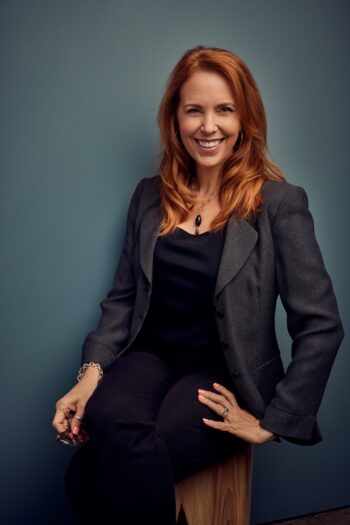
Taylor Boyett says licensed products, and particularly toys, allow children to extend and tell their own stories through play, based on the characters and the world created in Iyanu. That’s one major reason the studio focused early on finding the right licensing partners in the toy industry, in order to bring toys and other products to the market that reflect the diversity and values from the series.
“For Iyanu, we see tremendous potential across multiple merchandising categories, as it transitions from Roye Okupe’s graphic novel into an animated series,” Taylor Boyett says. “Excitingly, we’ve already secured anchor partners in key categories, including toys, games, and STEAM (Science, Technology, Engineering, Arts, and Math) products.
“Through our multi-year partnership with Kidazzle, we will manufacture and market a diverse array of toys featuring key characters from Iyanu, including dolls, action figures, play sets, role play and more,” she adds. “Additionally, we’ve partnered with Brown Toy Box, a leader in culturally relevant educational toys, to create a new line of STEAM kits. Each kit will focus on a specific character from Iyanu and explore themes like engineering, chemistry, and more, offering an inspiring and immersive way for kids to learn while engaging with the vibrant world of Yorubaland.”
With those partnerships in hand, Taylor Boyett is now turning her attention to other licensing categories, which she believes is important in both growing, and interacting with, the fan base.
“This foundation lays the groundwork for a dynamic program, allowing us to connect with fans of all ages across multiple touch-points, ensuring lasting connection and engagement with audiences,” she explains. “We are now looking for partners in apparel, accessories, collectibles, food & beverage, footwear, health & beauty, gifting, home, costumes, and more to help bring the Iyanu series to life across a wide range of consumer experiences.”
Steward also sees licensing as a major part of the business for other projects as well, and the company is very much focused on creating a licensing program that can serve all of its future IP.
“As we continue to greenlight, produce, and distribute compelling content, our licensing strategy will evolve alongside our growth to continue championing and spotlighting diverse, under-represented stories,” he says. “Through innovative storytelling and building strategic partnerships, we aim to build an ecosystem connects with audiences worldwide and create new opportunities to extend our IP into various global markets and industries.”
Given Lion Forge Entertainment was only founded in 2018, the studio has already achieved a great deal, particularly when you consider it’s spent most of its existence in the shadow of the COVID-19 pandemic, as well as the job action in Hollywood.
Now, with an Oscar under its belt and a hot property ready to hit the market in early 2025, Steward says the company is poised for expansion as a global entertainment studio, helped along by the team’s experience in creating content that reflects different cultures and gender experiences.
“At Lion Forge, we aim to make a lasting impact by creating stories that not only entertain, but also enlighten and educate,” Steward says. “We believe in the power of story telling to inspire change, spark conversation, and offer fresh perspectives on the world around us.
“Our goal is to be a brand that is recognized for authentic representation, creating content that reflects the diverse experiences, cultures, and voices that are often under-represented in mainstream media.”
(Editor’s Note: Anyone interested in more information or in exploring licensing opportunities with Lion Forge can contact Amy Taylor Boyett at this address: Amy.TaylorBoyett@lionforge.com.
